
Ted Manning, Chairman
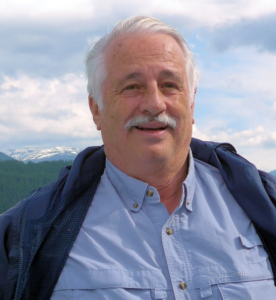
Dr. Ted Manning is President of Tourisk Inc., an international consulting firm based in Ottawa and providing integrated planning for heritage sites and tourism destinations, development of measures of sustainability, and accessibility and environmental management solutions worldwide.
His website is www.tourisk.com,
Dr. Manning has worked in more than 50 countries in the creation and implementation of improved methods for planning environmentally and culturally sensitive areas and reduction of the ecological and social footprint of human activities, particularly regarding tourism for the UN World Tourism Organization, World Wildlife Fund, and the UN Industrial Development Organization for its coastal development program in Africa. He has served as Executive Manager of Sustainable Tourism for Tourism Canada, Director of Sustainable Development for Canada’s Government Consulting Company, and Associate Director of Sustainable Development and Chief of Land Use Policy and Planning for Environment Canada. He has published 25 books and over 100 articles on sustainable development, tourism, wellbeing. and environmental management topics. He has also served as President of the Canadian Association of Geographers, a director of the Social Science Federation of Canada, and as Adjunct Professor of Geography and Environmental Studies at Carleton University. He is currently a full member of the International Club of Rome.
Nigel Weir, Vice-Chairman

Nigel Weir was born in London, UK. He has a B.Sc. in Chemistry and passed early years at Northern Electric R&D on the development of integrated circuits. Returning to university, he obtained an M.A. in Economics and joined the Federal Government in the Research Branch of the CRTC. He was involved in a wide range of studies on the Canadian communications industries concerning their economic health, social issues, and policies to promote Canadian programming. He became Director of Policy Research.
Now retired, he is interested in the formulation of a “new economics” which reconciles “progress” and preservation of the natural environment.
As a volunteer, he has participated in village projects in less developed countries, as a speaker for Friends of The Earth, and with Friends of The Public Library.
Jean Dougherty, Secretary (also Past Chairperson)
 As a trained biologist and geologist, Jean had a 36-year career with the Geological Survey of Canada, working to maintain Canada’s treasures of paleontological specimens and data. These fossil collections are used to understand the vast geologic history of Canada, providing a timescale for this history, understanding how the Canada’s landmass has changed through time, and at what rate this change has occurred. Today, this highly informative science—which some see as esoteric—underpins our understanding of anthropogenic climate change and provides primary evidence that this change is actually happening. Presenting explanations of why geology and paleontology are important to citizens became a major focus of her endeavours. These presentations explain how fossils are used in geologic research, how we know our current climate crisis is anthropogenic in origin, and how geology should inform decisions about land use planning and resource management.
As a trained biologist and geologist, Jean had a 36-year career with the Geological Survey of Canada, working to maintain Canada’s treasures of paleontological specimens and data. These fossil collections are used to understand the vast geologic history of Canada, providing a timescale for this history, understanding how the Canada’s landmass has changed through time, and at what rate this change has occurred. Today, this highly informative science—which some see as esoteric—underpins our understanding of anthropogenic climate change and provides primary evidence that this change is actually happening. Presenting explanations of why geology and paleontology are important to citizens became a major focus of her endeavours. These presentations explain how fossils are used in geologic research, how we know our current climate crisis is anthropogenic in origin, and how geology should inform decisions about land use planning and resource management.
She has been active in her community, serving on several boards, as a union steward for the Professional Institute of the Public Service of Canada (ending as the chief steward for Natural Resources Canada), and as a soccer coach, and a karate instructor for children. Now retired, she is spending more time with her family, especially her grandchildren, with the objective of doing what she can to leave the planet in a state in which her grandchildren may have a decent quality of life.
David Head, Treasurer
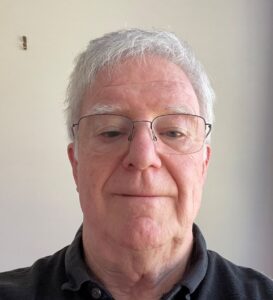
Dave obtained a PhD in chemistry at University of British Columbia. He spent 24 years as a federal civil servant working in a number of departments and agencies, including Atomic Energy of Canada, Indian and Northern Affairs, the National Research Council, and Industry Canada, reaching the level of Director General. Thereafter, in British Columbia he ran an industry agency that took back waste solvents, pesticides and gasoline. After a second retirement he managed a social agency in Penticton BC that supported people with a brain injury. Dave has had an extensive volunteer career, serving on more than a dozen boards of directors for organizations in Ottawa and BC with a wide variety of goals, from a Young Offender group home to a 12 bed hospice. Presently, he is a member of the board of directors for a child care organization in Ottawa.
Fernande Faulkner, Director

A native of Ottawa, Ms. Faulkner a sociologist, first did her graduate work on women’s roles and analyzed different models of family formation. She went on to be President of TRI-SC, a firm founded by two polling companies based in Montreal to analyze social and cultural trends in Canada. As an independent consultant she worked for the then Secretary of State and the Canadian International Development Agency. After conducting a number of environmental impact analyses she moved to analyzing the impact of the introduction of computers in organizations. Working mostly in the fields of technological tools in support of translation and office automation, she co-founded Socioscope in 1979 and worked for a year with the Department of Communication in 1980 to conduct a field trial and develop policies supporting the implementation of office automation. For CIDA, she worked on managing field projects online.
In 1992, she moved to New York for fifteen years, first working for the United Nations Development Programme (UNDP), and subsequently consulting with Erickson Faulkner Foster to the whole UN system where she worked on large scale organizational change and reform in the UN system. In this context a range of new competencies were identified and implemented as required by traditional organizations looking to revitalize themselves. She has worked with this focus with a number of UN agencies such as UNICEF, UNIFEM, UNDP, IFAD, and FAO. She has developed the competency profile for the UN coordinator system and carried out a large scale evaluation of the humanitarian sector.
Living in Vancouver since 2006, her focus has been on the integration of immigrants and refugees, working as a volunteer with institutions and programs of the YMCA and the ISS of BC. Dancing is her way to build community with indigenous, ageless, and all bodies groups.
Gabriella Gref-Innes, Director

Gabriela has been a member of CACOR for close to 20 years and served on the board of directors for 4 years until 2018. She has also been a chair of the Values Committee for 5 years and co-chair of the Program committee and member of several other committees. In 2013, Gabriela retired from full time Public Service with the Federal Government, where she worked for over 35 years in various capacities from different departments, in the field of International commerce and development. She dealt with international Governments, United Nations, and other International Financial Institutions, and supported Canadian companies in various sectors including environment, space, and transportation. Prior to joining the Federal Government, Gabriela launched one of the first international trade companies in Ottawa, owned by a woman through which several Trade Commissioners received some training. Educated in Europe (Romania) and Canada (Carleton University, Ottawa), Gabriela’s field has been in Literature and Arts, and in International relations and Commerce. Gabriela has been a full-time advocate for justice, equity, and protection of nature’s diversity and rights. As a mother of four and grandmother of seven, Gabriela feels fully committed to using her network in supporting the future and healthy survival of our environment.
Richard van der Jagt, Director
 [Information to come.]
[Information to come.]
Raymond Leury, Director
 Raymond’s academic background includes several years spent studying pure sciences, focused on chemistry, at the University level. After obtaining a BCom in Management Information Systems and an MBA from the University of Ottawa, Raymond’s career was focused on strategic consulting and implementing change in the Information Technology space both as an internal specialist and as an external consultant. The combination of a technical and business backgrounds allows Raymond to analyse situations based on factors that run the spectrum from technical feasibility to user acceptance. Technical feasibility and business feasibility had to be aligned for any project to succeed. Every customer engagement included projects to implement technical changes that in many cases had significant impacts on the stakeholders and their day-to-day jobs. Technology implementations are straightforward. Getting organizations to embrace change is much more challenging.
Raymond’s academic background includes several years spent studying pure sciences, focused on chemistry, at the University level. After obtaining a BCom in Management Information Systems and an MBA from the University of Ottawa, Raymond’s career was focused on strategic consulting and implementing change in the Information Technology space both as an internal specialist and as an external consultant. The combination of a technical and business backgrounds allows Raymond to analyse situations based on factors that run the spectrum from technical feasibility to user acceptance. Technical feasibility and business feasibility had to be aligned for any project to succeed. Every customer engagement included projects to implement technical changes that in many cases had significant impacts on the stakeholders and their day-to-day jobs. Technology implementations are straightforward. Getting organizations to embrace change is much more challenging.
Raymond retired six years ago from an Information Technology career. Taking Al Gore’s Climate Reality Corps training in 2017 has reignited Raymond passions for the environment and addressing climate change in particular. As President of the Electric Vehicle Council of Ottawa (EVCO), with his team he has spearheaded a number of initiatives including the successful campaign to get OC Transpo to transition to a fully electric bus fleet. Raymond has spent much of his time researching and advocating for EVs of all sizes from light duty to medium and heavy-duty vehicles. Questions about energy and materials required for the electric transition led Raymond to study if and how it would be possible to develop and implement the necessary technology within the confines of the limited resources that we have on our one and only planet.
Since retirement, leveraging skills developed during his career, Raymond has focused on reducing GHGs by driving change in the areas of electrification including the transition to electric transportation.
Ruben Nelson, Director
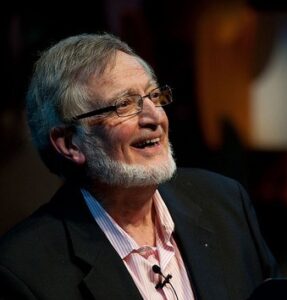 Ruben Nelson is a big picture strategic thinker. A Canadian pioneer of serious futures thinking, Ruben has spent his life exploring and seeking to understand the forces that are now re-shaping our lives, our world and our future. For over fifty years, Ruben has lived as a freelance intellectual contributing to such diverse areas as civilizational evolution and transformation, social policy, technology assessment, futures research, strategic foresight, the knowledge-based economy/society, and citizen engagement. He has offered strategic policy advice to Cabinet Ministers, Board Members, and senior executives in every sector of Canadian society. He is equally at home in conference rooms, board rooms, community halls, and church basements.
Ruben Nelson is a big picture strategic thinker. A Canadian pioneer of serious futures thinking, Ruben has spent his life exploring and seeking to understand the forces that are now re-shaping our lives, our world and our future. For over fifty years, Ruben has lived as a freelance intellectual contributing to such diverse areas as civilizational evolution and transformation, social policy, technology assessment, futures research, strategic foresight, the knowledge-based economy/society, and citizen engagement. He has offered strategic policy advice to Cabinet Ministers, Board Members, and senior executives in every sector of Canadian society. He is equally at home in conference rooms, board rooms, community halls, and church basements.
Today, Ruben is Chair of Resilient Canmore and the Transformation Research Network, and Executive Director of Foresight Canada. Ruben was born and raised in Alberta. He has watched Alberta morph from the province in which he was born into an economic powerhouse on which Canada came to depend, and to take for granted. He lives in the Rocky Mountains of Alberta with Heather, his wife of 61 years, and their cats. They have two adult children.
Geoff Strong, Director
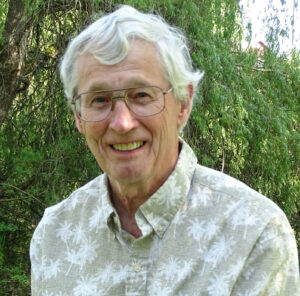
Geoff is an atmospheric/climate scientist by profession, a Fellow of and former national President of the Canadian Meteorological & Oceanographic Society (CMOS, 2006-07), and has received several awards from that society during his career that began in 1963. He was nominated in 2023 for the prestigious Patterson Medal from Environment Canada.
Since retiring from Environment Canada in 1998, Geoff continued research on severe thunderstorm initiation, atmospheric moisture budgets, and prairie drought. He has provided public education on climate change by teaching environmental courses (at U of A, King’s University, and VIU), given hundreds of invited public talks on climate issues, and writes various newspaper and magazine articles. He is active in several environmental organizations, and is presently writing his third novel on climate change, plus a book on science in scripture titled Questions of Environmental Stewardship Theology (QuEST).
Andrew Welch, Director
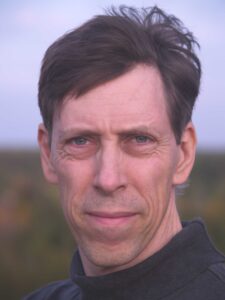 Andrew Welch is a speaker, researcher, and writer on the philosophical basis of human value systems and ecological economics. His first book, The Value Crisis, was published in 2014, with a sequel, Our Second Chance, published in 2022. His mission is to provide unique insights to global issues by combining heuristics and observations from multiple disciplines, and to communicate historical solutions using engaging narratives that are accessible to a wide general audience.
Andrew Welch is a speaker, researcher, and writer on the philosophical basis of human value systems and ecological economics. His first book, The Value Crisis, was published in 2014, with a sequel, Our Second Chance, published in 2022. His mission is to provide unique insights to global issues by combining heuristics and observations from multiple disciplines, and to communicate historical solutions using engaging narratives that are accessible to a wide general audience.
Andrew’s background is powerfully diverse, beginning with Hons. Math/Computer Science and Theatre at the University of Waterloo. For the past 20 years, he has been in demand as a skilled corporate facilitator, guiding intact teams through difficult challenges and transitions. In 2008, he created the WattPlot™ suite of software which monitors renewable energy systems at over a thousand sites worldwide. Andrew is an Emergency Response Team Site Manager (volunteer) with the Canadian Red Cross, deployed across Canada, and was a founding member of their National Disaster Management Evaluation Team. He also co-founded Transition Erin––a Transition Town movement in Erin, Ontario.